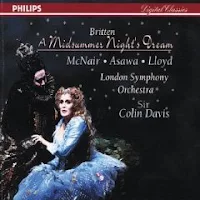 Benjamin Britten, A Midsummer Night's Dream. Brian Asawa (Oberon); Sylvia McNair (Tytania); Carl Ferguson (Puck); Robert Lloyd (Bottom); Ian Bostridge (Flute). London Symphony Orchestra, New London Children's Choir, conducted by Colin Davis.
Benjamin Britten, A Midsummer Night's Dream. Brian Asawa (Oberon); Sylvia McNair (Tytania); Carl Ferguson (Puck); Robert Lloyd (Bottom); Ian Bostridge (Flute). London Symphony Orchestra, New London Children's Choir, conducted by Colin Davis. I have to confess that A Midsummer Night's Dream has been spoiled for me, at least musically speaking, by Mendelssohn. It's what I expect to hear whenever I encounter the play, thanks largely to Warner Bros. and that mad 1935 version with Mickey Rooney as Puck and James Cagney as Bottom. Nevertheless, Britten's version, with its wonderful orchestral variety, grows on me every time I hear it. I sometimes wish that Britten had had Shakespeare as his librettist for everything, instead of people like Myfanwy Piper. (Someday I will find out how to pronounce "Myfanwy," and stop thinking "my fanny" every time I see it.) This is a lovely recording: Sylvia McNair is a sweet-voiced Tytania, Brian Asawa a commanding Oberon, and Robert Lloyd acts splendidly as Bottom. But in some ways the biggest surprise is Ian Bostridge, whom I'm used to thinking of as a rather arty singer; but he's hilarious as Flute/Thisbe.


